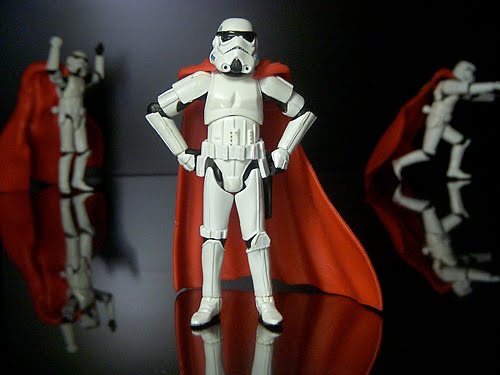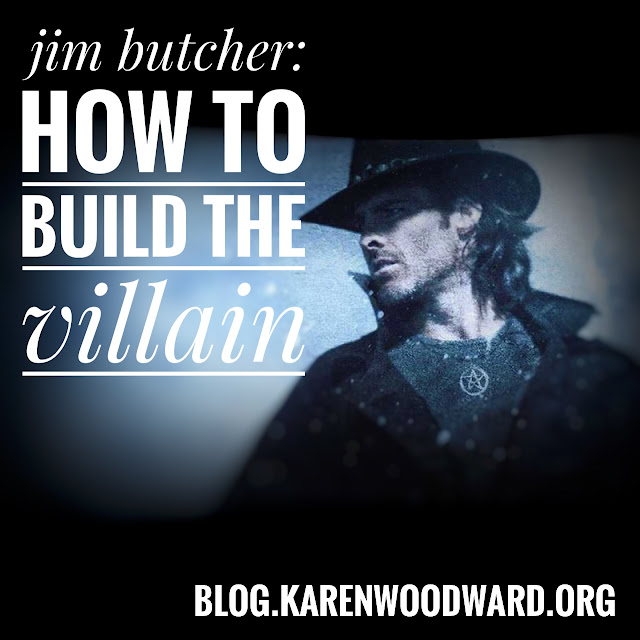Someone once said to me: The first few pages of a novel sell that novel, the ending of the novel sells the next novel.
I believe that.
Endings are important. If I like a book but hate the ending I probably won't read another book by the same author.
How does one create an exciting, satisfying, ending?
Yesterday, as I worked on the ending for my WIP, I wondered: Is this any good? Is it interesting? Exciting? How can I tell? What makes an ending good? Bad? Indifferent?
So I did what I usually do at times like those, I went to my digital library (also known as the internet) and re-read Jim Butcher's essay, Story Climax. It's an informative, easy, read. And it's funny. (Sometimes I think humour is like the spoonful of sugar that helps the medicine go down.)
Jim Butcher is a funny, brilliant and wildly successful author--a #1 New York Times bestseller--so I'm going to try and dip into his well of wisdom and talk about a few of his thoughts about what goes into creating an exciting, couldn't-stop-reading-if-you-wanted, ending.
What do readers want?
I think that the key to success in writing is to figure out what your readers want and give it to them. So, what do readers want?
The ending should be vivid.
Jim Butcher writes that if you've gotten your readers emotionally invested in the story then, "when you reach story's end, they are INVESTED in its outcome. They want to SEE what happens, preferably as vividly as they possibly can."
The ending should be satisfying.
Jim Butcher writes:
"By the time you've reached the end of a story, a good writer has got their readers on the edge of their seats, at 3:30 in the morning, and the pages are tearing every time they turn because the reader is so excited.
"You've made an implicit promise by getting your reader so bound up in the story. You've /got/ to deliver on it, or that reader is going to freaking /hate/ you for doing that to them. They are gonna go away from that ride all hot and bothered and frustrated as hell. That's what catharsis is: the release of all that tension and sympathetic emotion that the reader has built up because of the writer's skill at weaving the story. Done right, your readers will cheer and cry and laugh out loud and dance around their living room."
We can see that a lot is riding on writing a vivid, satisfying, exciting, climax. This just intensifies my need for an answer to the question: How does one go about doing that?!
1. A specific, concrete, event should mark the start of the climax.
It's all about dominos.
About two-thirds of the way through a story, right after the great swampy middle, there's an event that is akin to the first domino dropping, an event that sets in motion a cascade of rising action that sweeps the reader inexorably on toward the conclusion of the story.
2. The conclusion, the climax, of a story has six parts.
Jim Butcher writes:
"The actual climax itself, the absolutely peak of it, though, is what I generally refer to as the Showdown or the Throwdown or the Beatdown, depending on my mood and testosterone levels at the moment. The most dramatic point is the actual confrontation between your protagonist and antagonist, where they are directly contending with one another, and where both of them know that the story question is about to be answered.
"For THAT confrontation, there several structural components that you can use to organize it that will be really helpful, much like the components used in a Sequel [...]."
These are:
a. Isolation
b. Confrontation
c. Dark moment
d. Choice
e. Dramatic reversal
f. Resolution
Let's go over each of these in turn.
a. Isolation
At the end, the hero should meet the villain by himself without backup. Jim Butcher writes:
"At the end of the day, your protagonist stands alone. That's why that character is the protagonist. Oh sure, there can be other people around, but the one who really COUNTS is your protagonist. The more alone he is, the higher the tension levels are going to be, and the more satisfying the climax is going to be for the reader."
b. Confrontation
Your hero, your protagonist, should bring the fight to the antagonist. He or she confronts the Big Bad, the Nemesis. Butcher uses Inigo Montoya as an example:
"Hello. My name is Inigo Montoya. You killed my father. Prepare to die."
Best. Scene. Ever!
c. Dark moment
As Butcher writes, the confrontation between hero and villain "Does Not Go Well." The hero finds out he's completely outclassed and, moreover, that what he thought was the worst possible outcome wasn't. The cost of losing is actually much, much, worse.
Jim Butcher doesn't use this name, but this beat has also been called "All hope is lost." He writes:
"In the recent Narnia movie, that moment was at the death of Aslan. The Great Lion is gone, the White Witch has made fashion accessories out of his mane, the bad,guys have them outnumbered and outgunned, and there's just no way to win the fight that's coming the next day--but the folk of Narnia need Peter to lead them."
d. Choice
Here's where Jim Butcher's books really shine (IMHO). It's all about choice. He writes:
"Your protagonist has to CHOOSE whether or not to stay true to his purpose or to let himself be swayed by fear, by temptation, by weariness, or by anything else. In that Dark Moment, he has to make the call that ultimately reveals who your protagonist really is, deep down. And the choice has GOT to be a BAD one. If it's an easy choice, there isn't any drama to it--no tension, no release for the reader."
The first time I read that I was thrown. Bad choice? What did Jim Butcher mean by that? Should my protagonist go to the dark side and start torturing kittens?
No. Of course not. A bad choice is a choice that any rational person would consider crazy. Insane. Here's Butcher's example:
"'Use the Force, Luke,' urges ghost-Kenobi's voice. 'Let go, Luke!' Luke visibly makes a choice, turning off his targeting computer, putting his faith in the Force to make the shot that the whole galaxy is literally riding on, the way a Jedi should. He's alone, with the baddest guy in the movie hot on his tail, and even his friends are telling him he's nuts. 'His computer's off. Luke, you've switched off your targeting computer! What's wrong?' 'Nothing!'
says Luke. 'I'm all right!' Not ONLY is he about to get blown out of the air by Vader, but he might miss the shot, too. Luke is about to do something INSANE. He's about to sacrifice his life to take a literal shot in the dark."
Luke's choice wasn't a bad choice, it's the only choice that would have worked, but it seemed completely crazy, insane, to all his friends and allies.
By the way, here's where all that character development you've done comes in handy. Your readers need to know the hero well enough--their personality, their traits, their quirks--that taking the crazy high road is believable. At the end of Butcher's Dresden File books I often shake my head and think, "That's insane. That's so Harry."
e. Dramatic reversal
When I pick up a new Dresden Files book I know one thing: Harry's going to wipe the floor with some bad guys and he's going to come out of it okay. (Yep, Ghost Story threw me for a bit of a loop.) So we know that the crazy thing the hero does--the bad/insane choice he makes--is going to pay off in the end.
You'd think that that certainty would leech the story of its suspense. You'd think the certainty would make the eventual rosy outcome less than satisfying. But it doesn't. Why?
I think there are several things involved here.
First, although we strongly suspect the hero is going to come out of this just fine no matter what risks he takes, others might not.
Second, we don't know exactly how the hero will triumph. (Often there's a bit of mystery involved.)
Third, poetic justice. Jim Butcher writes:
"The intrinsic nature of the story or of the protagonist's character influences or causes the events of the confrontation to be changed in an unexpected way, causing an outcome that is in harmony with the principles of poetic justice."
Great storytelling is all about developing believable characters readers care deeply about, putting them in jeopardy and then, as in a magic trick, making it all work out in the end--or not.
f. Resolution
This is where everything gets wrapped up. Butcher writes:
"Time to hand out the medals, kiss the girl, go to the wedding, put the star on the Christmas tree, raise the curtain on the rock concert, attend the funeral, or otherwise demonstrate that with the conclusion of the story, some kind of balance has been restored. The catharsis is complete, the tension eased, and the reader can catch their breath now.
"My advice to you on resolutions: Keep it short. Once you've gotten through the Showdown, write as sparingly as possible to get to the end, and don't draw anything out any more than you absolutely must. You've already kept your poor reader up until 3:30, you heartless bastard. Let them get some sleep before they have to rush off to their shift in two hours!
"Then you get to type the most satisfying words in any book you'll ever write: T H E E N D"
I urge you in the strongest possible terms to read Jim Butcher's articles over at Livejournal.com if you haven't already. Not only is the advice sterling, but his articles are easy to read and delightfully funny.
Photo credit: "Falmouth" by *Light Painting* under Creative Commons Attribution 2.0.







